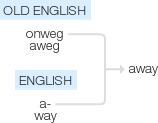Away
Old English onweg, aweg ‘on one's way’ (see a-2, way).
wiktionary
From Middle English away, awey, awei, oway, o wey, on way, from Old English aweġ, onweġ(“away”), originally on weġ(“on one's way; onward; on”), equivalent to a-(“on”) + way. Cognate with Scots awa, away(“away”), Old Frisian aweg, awei(“away”), Saterland Frisian wäch, wääge(“away”), Dutch weg(“away”), German weg(“away”), Danish væk(“away”), Swedish i väg(“away; off; along”).
away ( comparative more away, superlative most away)
etymonline
away (adv.)
late Old English aweg, earlier on weg "on from this (that) place;" see a- (1) + way (n.).
Meaning "from one's own or accustomed place" is from c. 1300; that of "from one state or condition to another" is from mid-14c.; that of "from one's possession (give away, throw away) is from c. 1400. Colloquial use for "without delay" (fire away, also right away) is from earlier sense of "onward in time" (16c.). Meaning "at such a distance" (a mile away) is by 1712. Intensive use (as in away back) is American English, attested by 1818. Of sporting events played at the other team's field or court, by 1893.
